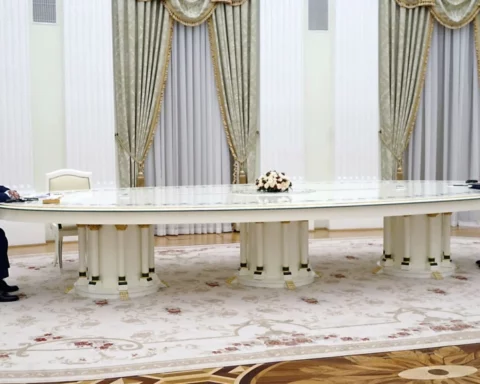Tunisian anti-terrorism authorities opened an investigation Friday into an online claim of responsibility by a person who said the attack on the Notre Dame Basilica in the French Riviera city of Nice was staged by a heretofore-unknown Tunisian extremist group.
From Pakistan to Russia and Lebanon, Muslims offended by the caricatures of the Prophet Muhammad and French President Emmanuel Macron’s firm stance against political Islam held more anti-French protests Friday. Macron’s government stood firm, and called up thousands of reserve soldiers to protect France and reinforce security at French sites abroad.
Investigators detained a second suspect in Thursday’s attack, a 47-year-old man is believed to have been in contact with the assailant the night before, according to a judicial official who was not authorized to be publicly named.
The attacker, Ibrahim Issaoui, was seriously wounded by police and hospitalized in life-threatening condition, authorities said.
A substitute prosecutor at the Tunisian anti-terrorism prosecutor’s office, Mohsen Dali, told The Associated Press that the claim of responsibility came in an online post saying the attack was staged by a group called Al Mehdi of Southern Tunisia, previously unknown to Tunisian authorities.
As France entered a new virus lockdown Friday, four soldiers with rifles periodically walked past the church in Nice and mourners placed flowers, messages and candles at the entrance, crossing themselves and praying silently for the three victims.
They included 55-year-old church warden Vincent Loques, a father of two. Arahmi Ihou, owner of an internet café next door, mourned him as someone who was “nice to everyone — people (of) all nationalities.
Parishioner Eliane Bacchetta said: “There’s COVID and the bad storms we had, but these acts of hatred, that’s really difficult. This is my church where I got married and had my children baptized and where I come and pray. Yesterday, my daughter was here with her little one and she was around when it happened – the 4 year-old is traumatized.”
Another victim was Brazilian-born Simone Barreto Silva, a 44-year-old mother of three who moved to France to join a dance group led by her sister and worked in elderly care, according to Brazilian media G1. Silva was playful and dreamed of traveling around the world in a food truck, her friend Ivana Gomes Amorim told G1.
“She was also a fighter, and she died like a warrior. Despite being hurt, she ran and was able to sound the alarm, preventing a bigger tragedy,” Anderson Argolo, a priest from an Afro-Brazilian religion who knew Silva’s family, told Folha de S. Paulo.
In an interview broadcast Friday with Saudi-owned Al-Arabiya TV, the attacker’s mother said she was shocked by the events.
From the Tunisian province of Sfax, the mother, her eyes wet with tears, said she was surprised to hear her son was in France when he called upon his arrival and had no idea what he was planning. “You don’t know the French language, you don’t know anyone there, you’re going to live alone there, why, why did you go there?” she said she told him over the phone.
His brother told Al-Arabiya that Issaoui had informed the family he would sleep in front of the church, and sent them a photograph showing him at the cathedral where the attack took place. A neighbor said he knew the assailant when he was a mechanic and held various other odd jobs, and had shown no signs of radicalization.
France on heightened alert as Muslim protests spread
France’s anti-terrorism prosecutor said the suspect is a Tunisian born in 1999 who reached the Italian island of Lampedusa, a key landing point for migrants crossing in boats from North Africa, on Sept. 20 and traveled to Bari, a port city in southern Italy, on Oct. 9. It is not clear when he arrived in Nice.
Tunisians fleeing a virus-battered economy make up the largest contingent of migrants landing in Italy this year. Italian media reported that from Lampedusa, where Issaoui was one of 1,300 arriving migrants on Sept. 20, he was placed with 800 others on a virus quarantine boat in Puglia.
After the two-week quarantine, he received a notice that he was being expelled from Italy for illegal entry and was given seven days to leave the country, according to Milan daily Corriere della Sera.
Italy’s interior minister confirmed Friday that the suspect was ordered to leave Italy on Oct. 9. Minister Luciana Lamorgese did not give further details on what, if any action, was taken to ensure the man complied with the order, but she said he was not flagged by either Tunisian authorities nor by intelligence agencies.
Lamorgese called Thursday’s attack in France ”an attack on Europe. Let’s not forget that Lampedusa, Italy, is the gateway to Europe.”
The attack was the third in less than two months that French authorities have attributed to Muslim extremists, including the beheading of a teacher who had shown caricatures of the Prophet Muhammad in class after the images were re-published by satirical newspaper Charlie Hebdo.
The images deeply offended many Muslims, and protesters burned on French flags, stomped on portraits of President Emmanuel Macron or called for boycotts of French products at demonstrations Friday in Pakistan, India and Afghanistan. Other protests, largely organized by Islamists, are expected across the region, including in Lebanon and the Gaza Strip.
Macron said he would immediately increase the number of soldiers deployed to protect French schools and religious sites from around 3,000 to 7,000. Schools remain open during a nationwide lockdown that started Friday to stem the spread of the virus, but religious services are canceled.
France’s interior minister said Friday that the country is “at war” with Islamist extremists, and the conservative lawmaker for the Nice region, Eric Ciotti, called for a “French-style Guantanamo” to lock up terrorist suspects.






